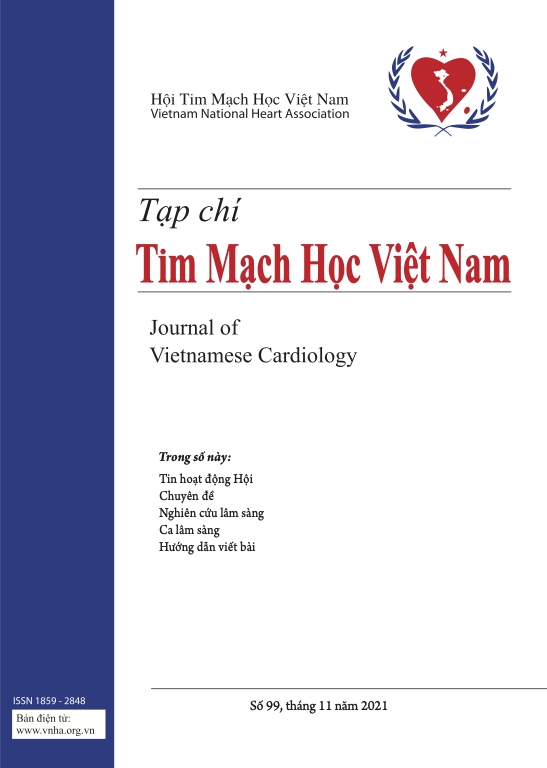Prognostic value of the severity of tricuspid regurgitation on Doppler echocardiography in patient with heart failure with reduced ejection fraction
DOI:
https://doi.org/10.58354/jvc.107E.2023.706Từ khóa:
tricuspid regurgitation, mortalityTóm tắt
Background: Tricuspid regurgitation severity has recently gained attention as a prognostic predictor of outcome events in patients who have leftsided heart failure. This study sought to define the relationship between tricuspid regurgitation and outcome in patients with heart failure with reduced ejection fraction.
Objective: To investigate the characteristics of tricuspid regurgitation by Doppler echocardiography in patients with heart failure and reduced ejection fraction. To explore the association between the severity of tricuspid regurgitation and short-term mortality and hospital readmission in the study patients.
Methods: 116 heart failurereduced ejection fraction patients were enrolled in this study, followed up, and evaluated after 3 - 6 months.
Results: 48.3% of patients have mild tricuspid regurgitation, 33.6% of patients have moderate tricuspid regurgitation, and 18.1% of patients have severe tricuspid regurgitation. 47 events (40.5%) occurred: 11 deaths (9.5%) and 38 readmissions (32.8%). A Kaplan - Meier curve showed that the survival rate of the severe tricuspid regurgitation group was significantly lower than the group with mild to moderate tricuspid regurgitation. A multivariate Cox regression model identified that tricuspid regurgitation severity was an independent predictor of 3-to-6-month mortality or readmission (HR 1.94; CI 95% 1.30 - 2.91).
Conclusion: Tricuspid regurgitation severity was an independent predictor of reduced ejection fraction in patients with heart failure.
Tài liệu tham khảo
Maggioni AP, Dahlström U, Filippatos G, et al. EURObservational Research Programme: the Heart Failure Pilot Survey (ESC-HF Pilot). Eur J Heart Fail. 2010;12(10):1076-1084. doi: 10.1093/eurjhf/hfq154
![]()
Virani SS, Alonso A, Aparicio HJ, et al. Heart Disease and Stroke Statistics-2021 Update: A Report From the American Heart Association. Circulation. 2021;143(8):e254-e743. doi: 10.1161/CIR.0000000000000950
![]()
Koelling TM, Aaronson KD, Cody RJ, et al. Prognostic significance of mitral regurgitation and tricuspid regurgitation in patients with left ventricular systolic dysfunction. Am Heart J. 2002;144(3):524-529. doi: 10.1067/mhj.2002.123575
![]()
Benfari G, Antoine C, Miller WL, et al. Excess Mortality Associated With Functional Tricuspid Regurgitation Complicating Heart Failure With Reduced Ejection Fraction. Circulation. 2019;140(3):196-206. doi: 10.1161/CIRCULATIONAHA.118.038946
![]()
Bartko PE, Arfsten H, Frey MK, et al. Natural History of Functional Tricuspid Regurgitation: Implications of Quantitative Doppler Assessment. JACC Cardiovasc Imaging. 2019;12(3):389-397. doi: 10.1016/j.jcmg.2018.11.021.
![]()
Agricola E, Stella S, Gullace M, et al. Impact of functional tricuspid regurgitation on heart failure and death in patients with functional mitral regurgitation and left ventricular dysfunction. Eur J Heart Fail. 2012;14(8):902-908. doi: 10.1093/eurjhf/hfs063
![]()








